What Is It Like to Live in Tbilisi As a Digital Nomad? Pros and Cons
We have been living in Tbilisi for almost 6 months now. I feel that it’s a good time to share a bit about our experience and tell how life here is. For us personally.
Will this be a good city for you? Is it worth moving to Tbilisi for the long term? I answer some important questions that hopefully will help you get a clear idea of how your life in Tbilisi may go.
MOVING TO TBILISI – THE BASICS
The reason why we decided to move to Tbilisi was that we wanted to find a base and settle somewhere long term. We were in Northern Spain at the time when making a decision to move to Georgia, were tired of constant travels and sought to find a cheap place where to live.
Getting in touch with a few expats in Tbilisi, looking into prices for apartment rent, and taking into consideration that fact that we could stay in Georgia up to 365 days a year without a visa, we came to a conclusion that at this stage of life Tbilisi is a perfect city to move to. So we packed and left.
But after only a few weeks here we began noticing more cons than pros and started to question if this city was right for us.
Your perception may be different. Whatever we consider a disadvantage, you may see as gain. I do not tend to sing praises only and skip the realities. My goal is to reflect on the positive and negative sides of a destination.
So read it, analyze and draw a conclusion if Tbilisi is a good pick for you. If you have more questions, feel free to drop a comment.
|| READ MORE ||
11 THINGS NOBODY TELLS YOU ABOUT LIVING & TRAVELING IN GEORGIA
GEORGIA COUNTRY TRAVEL: BEST THINGS TO DO IN GEORGIA ON YOUR FIRST VISIT
COST OF LIVING IN TBILISI
When it comes to the cost of living in Tbilisi, some foreigners proclaim (especially those who visit Tbilisi for a week or two) that everything here is very cheap or almost free. Compared with London, Paris or other major European cities, perhaps it is.
However, we live in Tbilisi and can attest that prices for many things are metropolitan, albeit it is not the richest city.
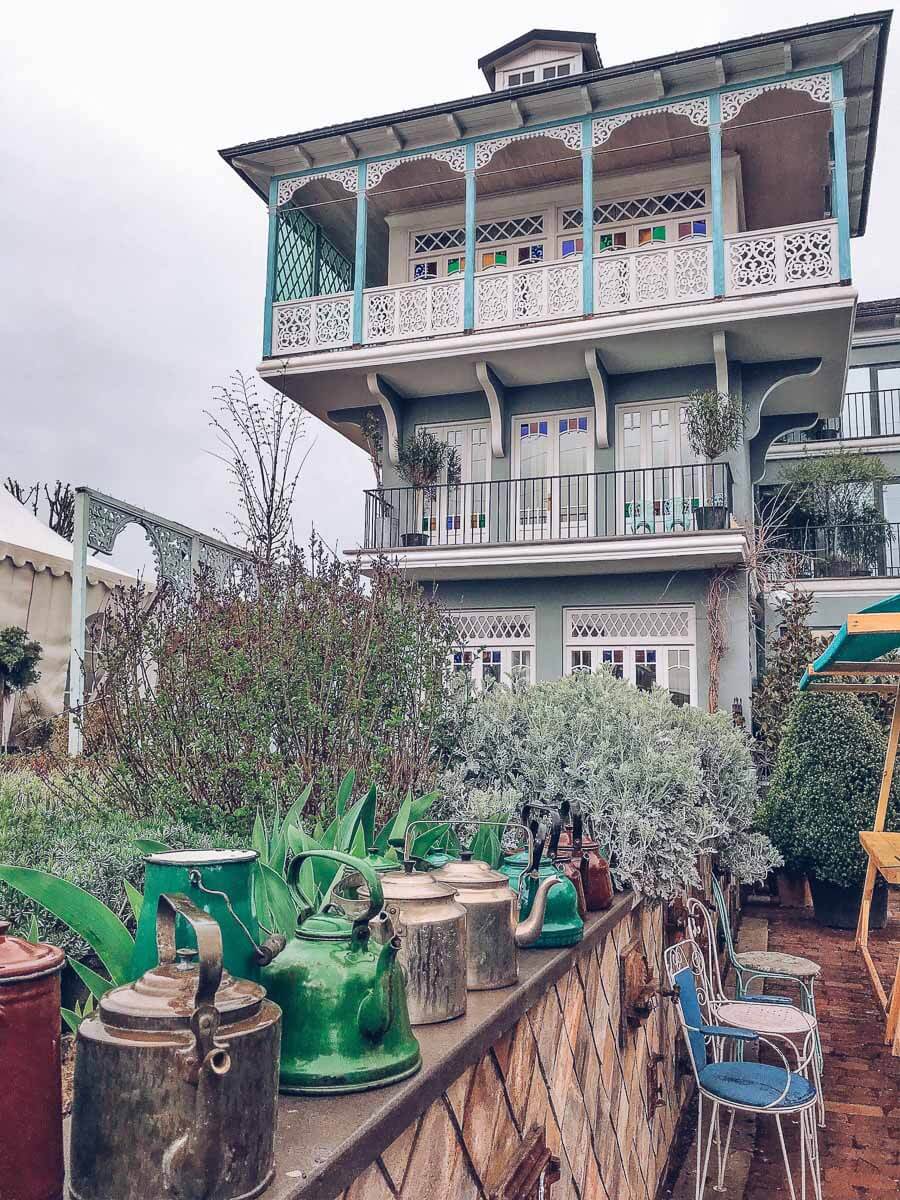
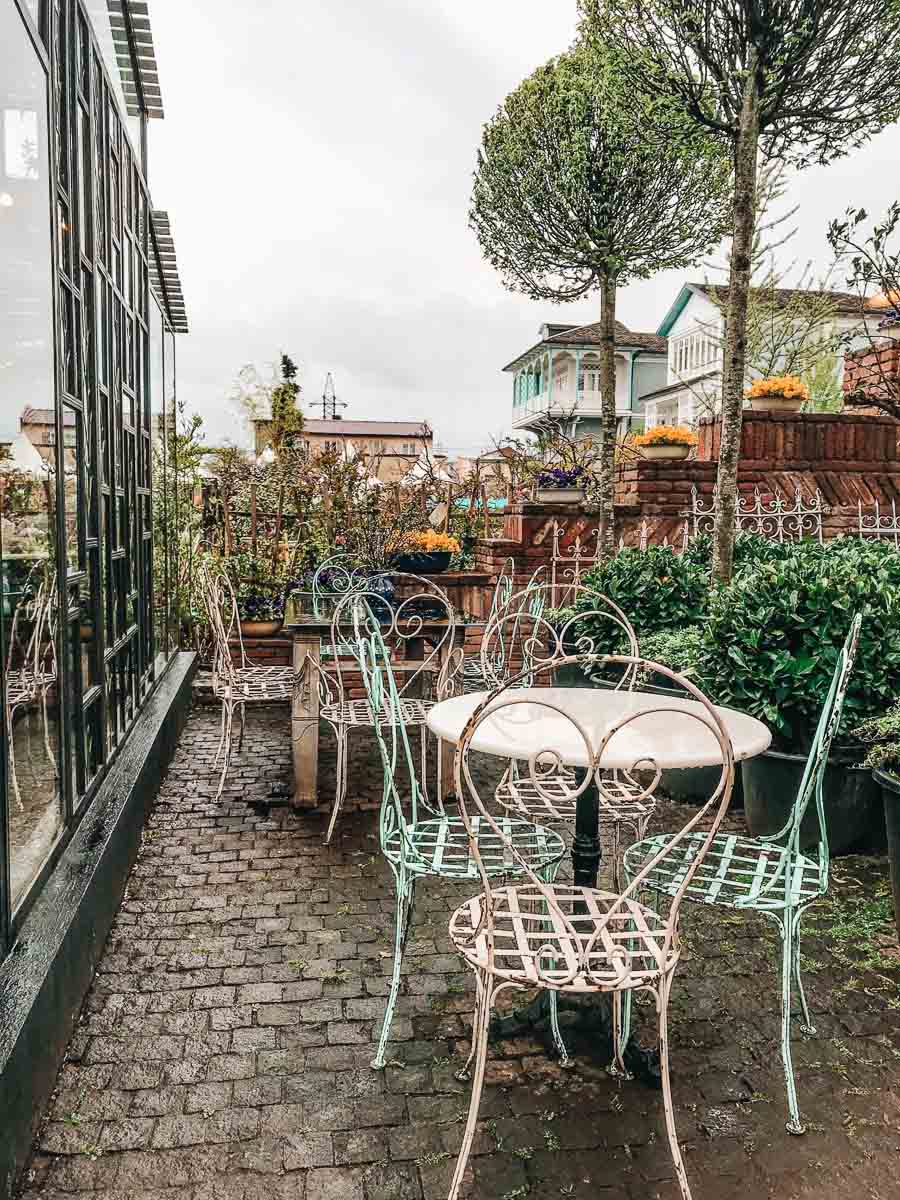
Tbilisi Prices for Food
Food in Tbilisi is not the cheapest. Of course, it depends on where and how much you eat, but even if cooking at home, expect to pay similar to what you would in many cities in Europe.
We personally cook most of the time and spend on groceries around $70 per week. This amount includes lots of fruits, vegetables, cheeses, grains, occasional meat, wine, and mineral water. A big variety of fruits and veggies comes from other countries and costs much more. Local produce is seasonal and rather cheap.
Gluten or dairy-free products in Tbilisi are not popular at all. Those that exist are insanely expensive (like $6-$7 for a pack of almond milk.) Seafood is pricey too.
Eating out at the restaurant costs around $15-$20 for two. A cup of latte costs $3-$4. In more simple cafes that sell khachapuri, we pay around $5-$7 for two (excluding drinks.)
The price of wine pleasantly surprises. Frankly speaking, it is difficult to try bad wine in Georgia. It may not impress you because of the taste, but the quality is always high.
The bottle of wine in a store starts from 10 GEL (unpretentious Saperavi or Tsinandali) or $4. Starting from 25 GEL ($10) you can indulge in a Kvevri wine (an old method of wine production in huge earthen vessels buried in the ground.)
Monthly Apartment Rent in Tbilisi
If you are looking to secure an apartment in Tbilisi for the long term, it may be a tad challenging to find it anywhere close to the Old part of Tbilisi. For the most part, owners rent it out on Airbnb starting from $30 per night and make much more money through a daily rent than a monthly one.
But, you don’t really want to make a base right in the center anyways. It is always noisy, crowded and more polluted.
Generally, expats who live in Tbilisi choose Vake, Saburtalo, Nutsubidze Plato, Ortachala, and Avlabari neighborhoods. This post explains in detail what some really cool neighborhoods in Tbilisi are.
Vake and Avlabari would be closer to the center. There, the price for a really nice spacious and comfortable apartment with recently made renovation starts from $400. For this money, you can get a beautiful one-bedroom flat. Of course, there are cheaper flats too, they are just smaller and more basic.
Just keep in mind that after the collapse of the Soviet Union, there is no central heating in Georgia. Everyone keeps his place warm as he can.
In flats in the Old town owners typically use an electric heater. In the newer built houses, you’ll find some type of a gas heating radiator, which is attached to the wall and most often only in one room. Flats that were built within the last few years have heating radiators on the walls of each room. They are heated by a gas heating system set on the balcony of each flat.
My advice is to try to rent an apartment in a newly built apartment complex to make sure you’ll be warm enough when cold times come.
It is also possible to find a flat for $150-200 per month. But expect it to be an old apartment, sometimes kommunalka type one, from grandmother’s times. No renovations or repairs took place there since at least 1985. Furniture and plumbing saw a few generations. The washing machine and refrigerator are not common at all.
You can rent a long term apartment in Tbilisi through a broker (this type of service is mega-popular here) or online.
We opted for another option. We booked a new apartment on Airbnb for one month. Then we got to Tbilisi, saw we liked our new home, and just made arrangements with an owner to extend for a few more months. You can try to do the same. I have a lot of friends who are living in Tbilisi until this day and they secured their long-term flats with the help of Airbnb.
Public Transport in Tbilisi
Tbilisi has sufficiently developed and convenient public transport, although not always comfortable. And, it is not as developed as its European analogs.
There are new buses on the capital’s main roads that run on schedule. But at the same time, there are lots of “marshrutka” buses that come and leave as they wish. They don’t have AC, are very old and outdated, fall apart, and are often late.
Getting to a more distant neighborhood may be a challenge.
We live in Upper Vake, for instance, which is relatively close to the center. Still, getting in and out of our neighborhood takes a lot of time simply because we are waiting for a marshrutka for too long. On average the wait time for us is 25-30 minutes. Once we get to the central street though, there are plenty of other buses to hop on.
The schedule for buses can be traced on the board on most of the bus stops. If there is none, simply send an SMS with the stop number to the short number (both are specified at the stop,) and the schedule will be sent to you in a reply message.
For marshrutka buses, download TTC app which shows you buses in real-time.
Tbilisi also has a subway. But it has only 2 branches and doesn’t cover a lot. The metro is open from 6 am to 12 am. At peak hours, the number of randomly moving passengers becomes a bit intimidating. Yet, this is the only mode of transportation that delivers from point A to point B without any traffic jams.
The fare in public transport in Tbilisi ranges from 50 to 80 tetri ($0.2-0.5). There is a single ticket for buses, marshrutka buses, and cable cars. You can pay by a Metro money card that you top up with money as you need or by credit card.
GETTING A JOB OR OPENING A BUSINESS IN TBILISI
The unemployment rate in Georgia is quite high, and salaries are not the biggest. It is caused by the low standard of living in the country.
A good salary is considered to be around 1000 GEL ($400). But finding a job in Tbilisi as a foreigner is quite challenging and not sure if it makes sense at all. Even if having higher education and knowing 3 languages (Georgian, Russian and English) the chances of finding a good job are not really high.
We’ve met a few expats who are working in Tbilisi but each of them got his job through a transfer, not when arriving jobless here.
Therefore, I would not rely on local vacancies.
What I would recommend implementing is your own business idea. Opening a business in Georgia is very easy and takes literally two days. Or even one, if willing to fork out on the registration of individual entrepreneurs and pay double tax.
Company Registration in Tbilisi
All you need to do when opening a business is to come to the House of Justice, which is located in the center of the city and resembles huge white mushrooms (you’ll definitely see it if look at the city from above). Here, you can do everything at once and in just one place.
The House of Justice offers over 300 services and sees up to 15 thousand people a day. If you want to register a car, get a birth certificate, or open a business – you have to go to the House of Justice.
In order to become an individual entrepreneur in Georgia, you need to provide a passport, a copy of the apartment rental agreement and pay directly on the spot 20 GEL ($8).
A registration certificate will be ready for a pick up at the House of Justice the next day or print it out from your personal account at your convenience. If you pay 50 GEL ($20), then the certificate will be ready within an hour.
After this process, you have to visit the IRS and register as a taxpayer. The cost of the service is 10 GEL or $4.
If you do not resell anything and work on your own, you will able to register as a micro-entrepreneur. This means that with a certain amount of income per year you are exempted from taxes and can submit the declaration electronically once every 365 days. Easy!
CULTURAL LIFE IN TBILISI
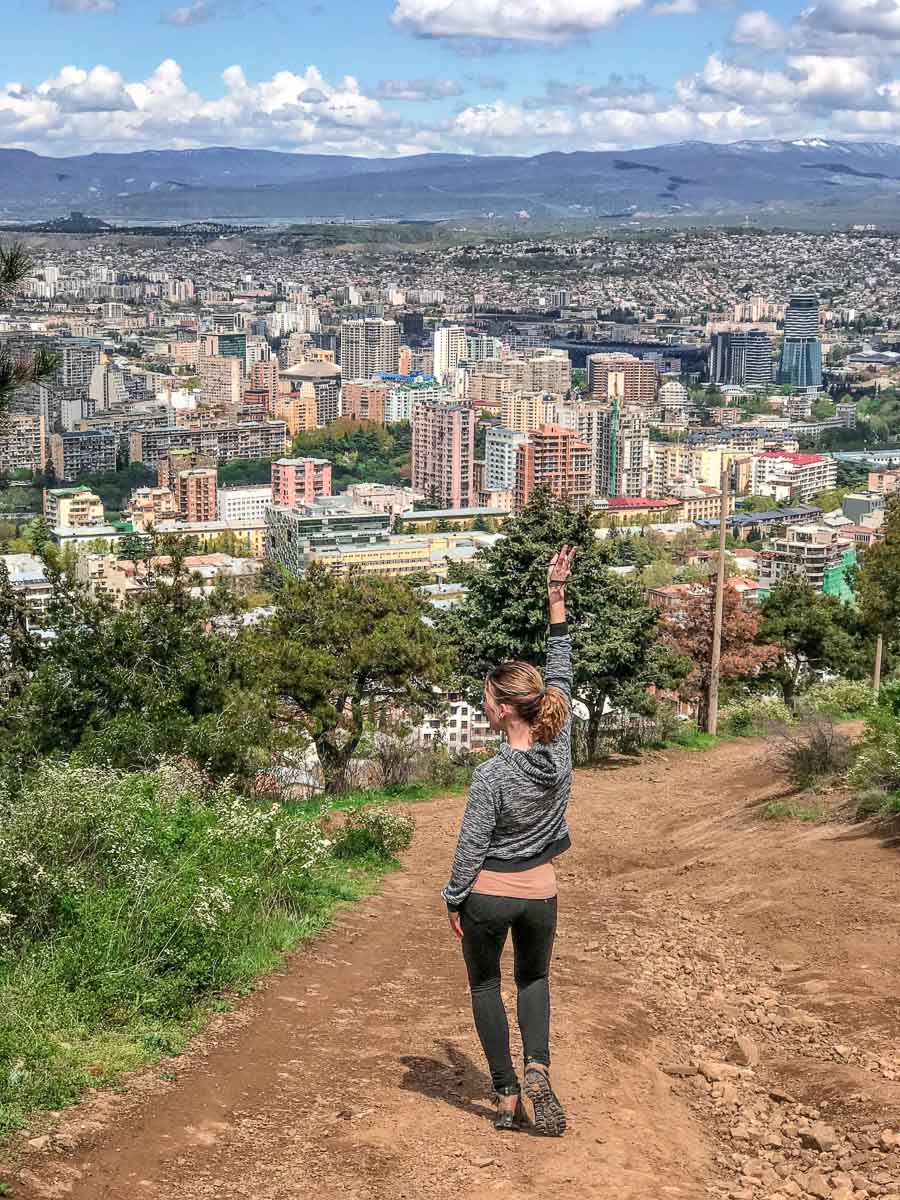
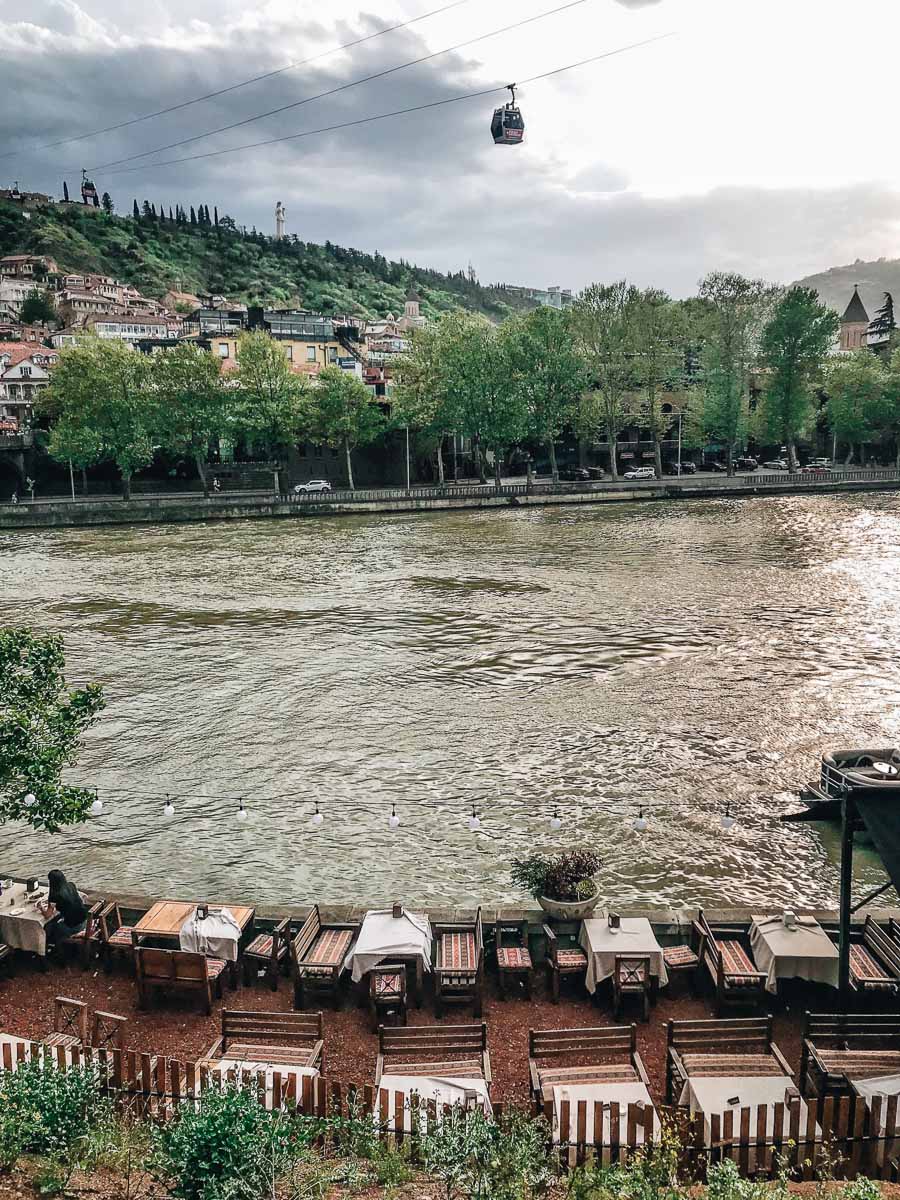
If you are moving from a provincial city to a small, but nevertheless capital, life around becomes a real kaleidoscope of events.
But, if you come from a big city full of action and activities, the capital of Georgia does not have that much to offer.
One of the museums always has interesting exhibitions. In summer, there are lots of various wine, cheese and tea festivals. Different open-air events and concerts take place too. And nightlife in Tbilisi is very rich.
During the summer, on Saturdays, you can enjoy the performance of the famous dance group “Sukhishvili.” Or jump on a speed train to Batumi and visit a Black Sea Jazz Festival. For more information on concerts and events in Tbilisi check this page.
Lovers of nightlife will also find what to do in Tbilisi. The famous techno club Bassiani is constantly in the ratings of various international publications as one of the best music clubs.
Foodies and gourmands will have plenty of restaurants to check out. And they are not limited to local cuisine only. In just one neighborhood you can have a French-style breakfast, come back for the best khinkali in the world, then move to an authentic Thai snack bar, and finish the day by eating a burger.
There are also a few hiking trails right in the city, lakes where you can relax and park on the top of the mountain where you can escape the heat.
Other than this, there is not much to add.
ADVANTAGES OF LIVING IN TBILISI AS AN EXPAT
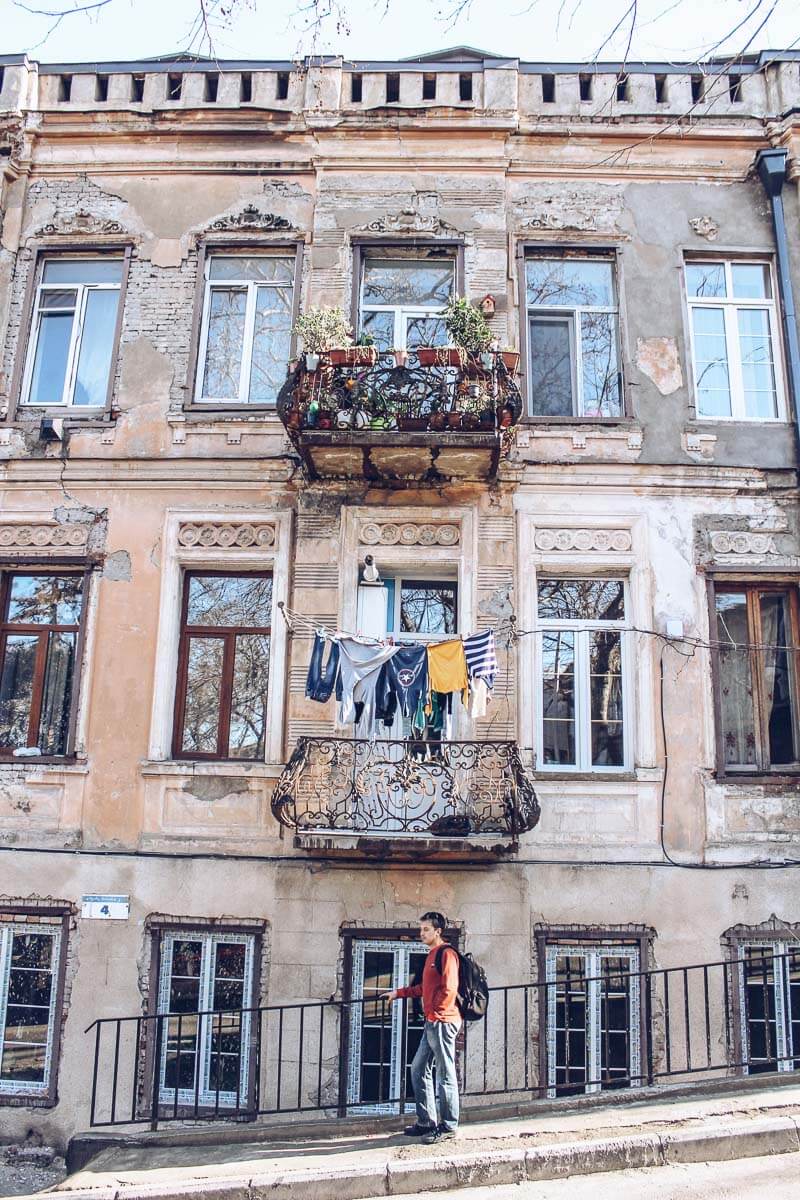
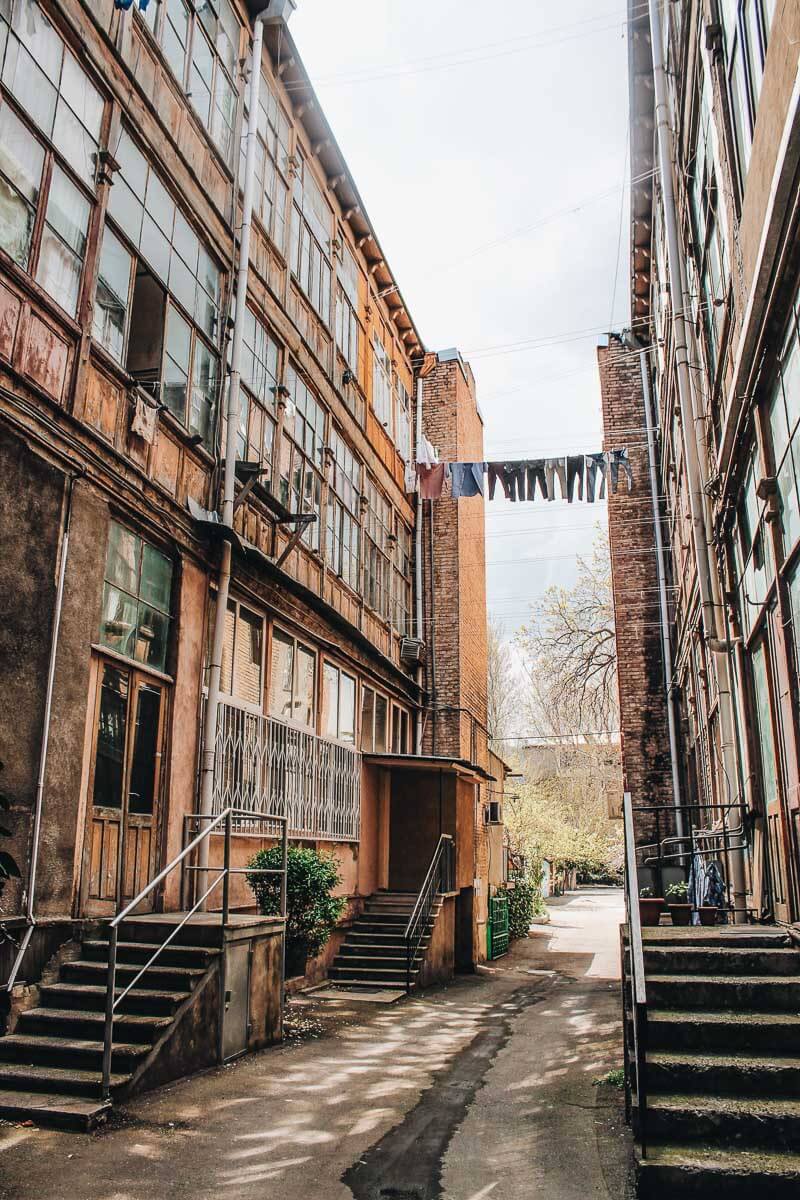
If you are a digital nomad who is making money online, life in Tbilisi for you will be cheap and easy. The food here is delicious, people are easygoing and open-minded. If you open your business, taxes you’ll pay will not be high.
The quality of a rented apartment is really high. And prices are still low (for those who make a Western world salary.) You can be paying $400-$500 per month for a new spacious and beautiful flat in a safe nice neighborhood. Just look to stay away from the center and go for newer buildings.
Utility payments in the winter period (this includes water, gas, electricity and garbage pick up) cost about 50 lari ($20), in the summer period – 25 lari ($10). The price for the Internet in Tbilisi is around 30 GEL or $12.
Among all the flats we rented during our digital nomad years, the one where we live now is simply the best. Our hosts are very accommodating, generous and understanding people.
If you move to Tbilisi, you’ll come across the same experience. And there will be so many beautiful homes to choose from.
The weather in Tbilisi is OK. Even though winters are gloomy and wet, it never gets too cold and snowy. Summers can be really hot and heat comes early. But if you can tolerate it well, you will enjoy it. In fact, visiting Tbilisi in December is really nice. The city looks bright and festive.
Another advantage is safety. There are a lot of poor people who live in Tbilisi, the city looks old and in many places shabby, but it is very safe.
|| READ MORE ||
VISIT THIS AMAZING WINERY AND HOTEL IN KAKHETI REGION
WHY LIVING IN TBILISI AS A FOREIGNER IS NOT FOR EVERYONE
Nature is Near But Nature is Far
When we were moving to Tbilisi, one of the reasons we were so excited was the fact that the mountains are near.
We love being close to nature and, even if living in the hustle and bustle of a dusty city, we need to know we can get away to the wilderness at least once a week.
A small country Georgia with a gorgeous wine region, impressive Caucasus mountain range, its own seaside with magnetic sands seemed to be a perfect place for that.
In the beginning, we were so excited. And we believed we could travel around the country every weekend. Or at least that we could travel from Tbilisi to Kazbegi or Kakheti region. In reality though, it turned out to be more difficult than we initially thought.
Indeed, besides the mountains, there are so many other beautiful natural landmarks that seem to be within a short distance from Tbilisi. But as experience showed, it is not that easy to get to them.
Buses (or “marshrutkas”) often don’t run on schedule. Due to the lack of driving culture, being a passenger in one of them is complete stress. But the most important thing is the fact that you can’t reach many places by public transport. Sooner or later you need to have your own vehicle or get a cab. Neither one is cheap.
Car rental on average costs between 30-50 euros per day. In the summer, it costs more. To know more about the process of renting a car in Georgia, you are welcome to read my guide.
There are a few cool parks and lakes right in Tbilisi. Still, knowing how much beauty lays out there, will make you want to get outside of the city. Plus, if you are a nature addict, the city itself will never be enough.
So, if you are living in Tbilisi as an expat or digital nomad, and you love spending more time in nature, do not expect it to happen a lot.
|| READ MORE ||
KAZBEGI, GEORGIA TRAVEL GUIDE: FAQ, Georgia Military Road & Best Things to Do
No Driving Culture in Tbilisi and Georgia in General
Only in Georgia, we learned how depressing driving a car and going on a road trip can become. Seriously, we’ve driven in many countries around the world, but somehow here, in particular in Tbilisi, being on the road as a passenger (in marshrutka or taxi) or as a driver stresses us out so much.
Drivers here don’t use turning signals, they often tailgate, speed, run red lights, cut off each other on the road, weave through traffic, always message on their phones and create lots of situations that increase the crash risk.
On many occasions when we ride in a car in Tbilisi, we have pre-accidental driving situations. Sometimes it happens to such an extent that both of us are shaking.
A few times it was so bad that we had to change our plans and go either back home or some cafe just to relax. It felt so stressful and uncomfortable that we needed to recharge.
What is even worse – it’s being a pedestrian.
Crossing a road or walking on a sidewalk more often is bigger stress.
It is not normal and it is definitely not for us. A few times we were bringing this question to drivers but they made stupid jokes, laughed at us or simply responded: “accidents happen, what can you do about them?”
The only thing we personally can do is not to live in such an environment because it ruins our peace and damages us from within.
I don’t think it really depends on which country you come from. I am originally from Ukraine, where driving used to be so bad, and it is really challenging for me to adjust and accept bad driving behaviors on the road.
If you are like us, prepare to have a lot of related to driving stress when living in Tbilisi. Oh, and don’t forget, as a pedestrian, you don’t matter at all.
Too Many Depressing Things in Tbilisi
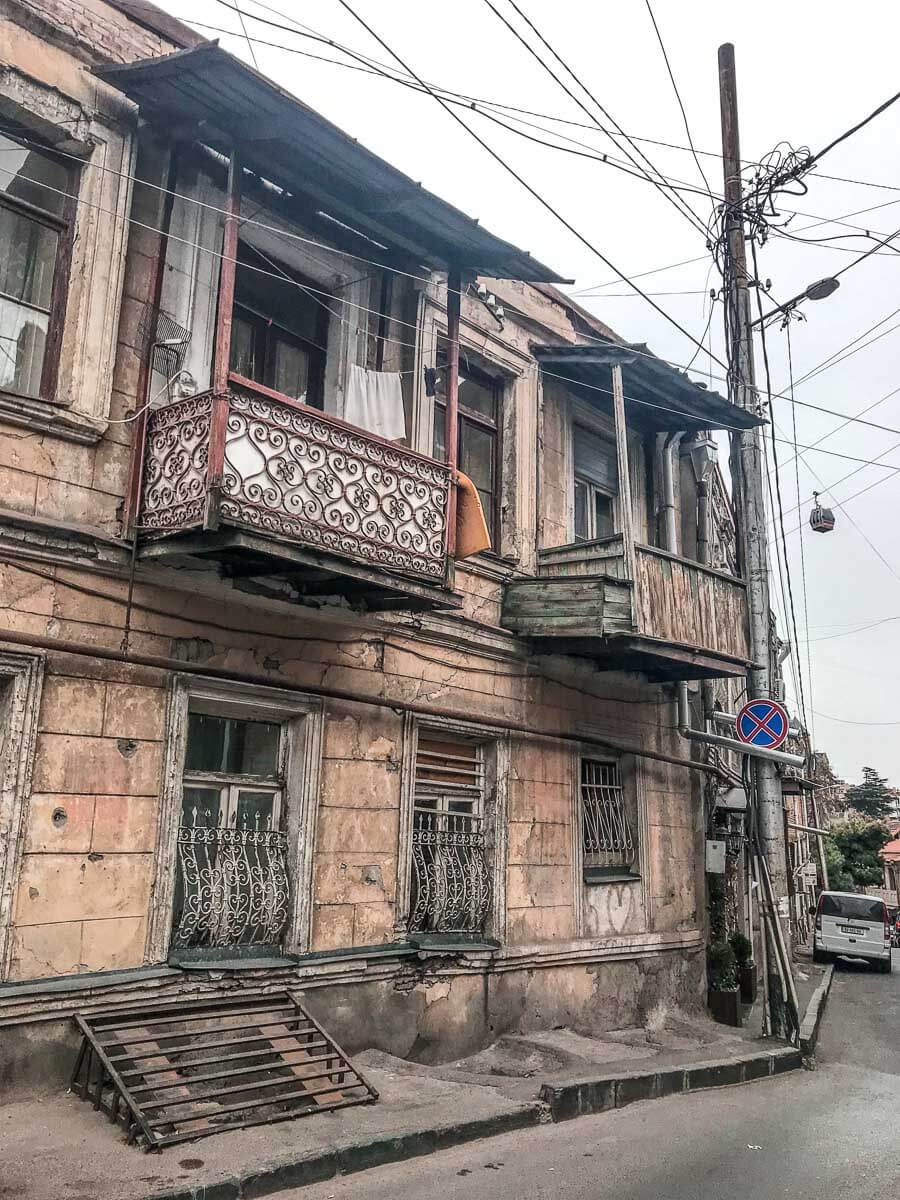
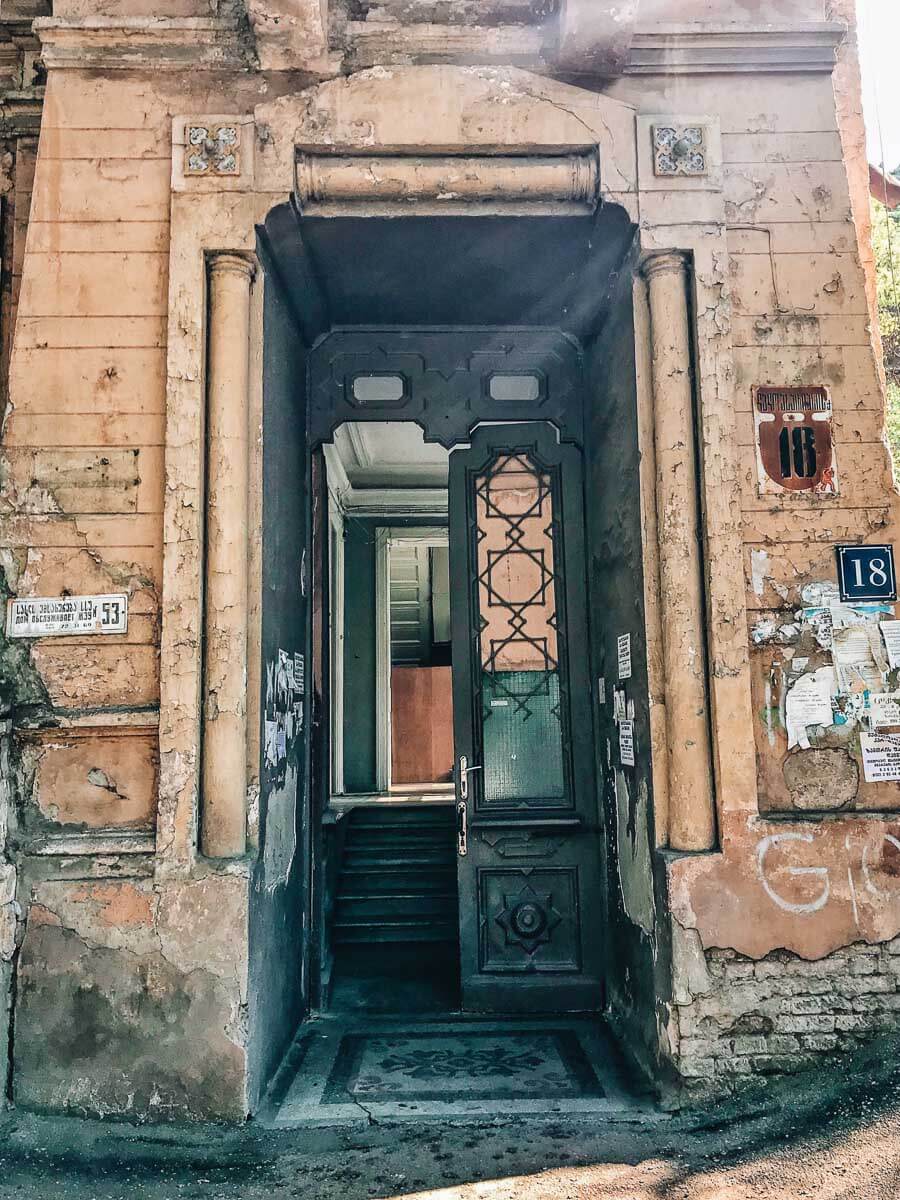
I may be biased since I come from Ukraine which was, like Georgia, part of the USSR. But a lot of things in Tbilisi and Georgia, in general, remind me of Ukraine 20 years ago. Back then I really wanted to run away from them. It seems now, 20 years later, I find the same things here in Tbilisi. And they upset me so much.
Some of those can make you feel depressed too. Especially if encountering them on a daily basis.
The level of poverty in the country is high. And we clearly see its presence in Tbilisi. There are cute streets with pretty cafes, trendy shops, and expensive cars parked nearby. But once you turn around the corner, you find yourself among the shacks where families live on $5 a day.
There are also so many abandoned and neglected buildings that are totally falling apart all over Tbilisi. You can find them everywhere and should be careful when walking nearby. If you are visiting Tbilisi as a tourist, seeing these houses may be an attraction. But if living long-term, running into them every day for some people is not that fun.
Lots of stray dogs, absolutely unsustainable development and living by many, loads of dogs’ poop on the streets, high level of pollution, and trash don’t make Tbilisi that comfortable. Of course, if you are like us and that matters at all.
One of the Least Eco-Friendly Cities in the World
One of the reasons why we feel uncomfortable living in Tbilisi is this city’s unfriendliness towards the environment.
You don’t really need to look up the statistics to see the details (although, here is just one of many posts on this topic.) From the first days in the city, you can feel how difficult it is to breathe, how incredibly heavy the air is, how much trash is on the streets and how many people do not care about recycling, cleaning up, and taking care of a place they live in.
There are so many old, outdated, dirty vehicles on the roads that mainly run on diesel, emitting more soot and particulates. With each day, more and more private vehicles enter the roads of the city, making pollution even worse.
Another huge problem is trash.
People do not recycle and do not think it is important at all. Today, in entire Georgia, there are only two landfills that meet international standards. And they are not even around Tbilisi.
Usually, when waste gets to the landfill, special machines press it and then cover with some soil. No steps are taken to fence it and put a special bottom liner to prevent the trash from coming in contact with the outside soil, particularly the groundwater.
It poses danger. And not only for those who live in close proximity to the dump. The rainwater seeps through the garbage, gets underground, and in this way pollutes groundwater which later ends up in the rivers.
Multiple initiatives and programs on waste management are not successful since the majority of residents do not care and do not take any action.
No matter how much we try to be sustainable in Tbilisi, we still add to the pollution. The country as a whole doesn’t take any measures to protect the environment. And that’s pretty depressing too.
CONCLUSION
There is no perfect place where you, as a foreigner or digital nomad, can live. Each destination has its own pros and cons. And you are the only one who can decide how comfortable you’ll be there.
We personally feel that it’s great to live in Tbilisi during the short term. We still get to know another culture and go through a new experience. But living in Tbilisi as digital nomads during a longer time is very questionable and not for us.
I hope after reading this post you get an idea of what type of city Tbilisi is. Will it be a great home base for you? Would love to know!
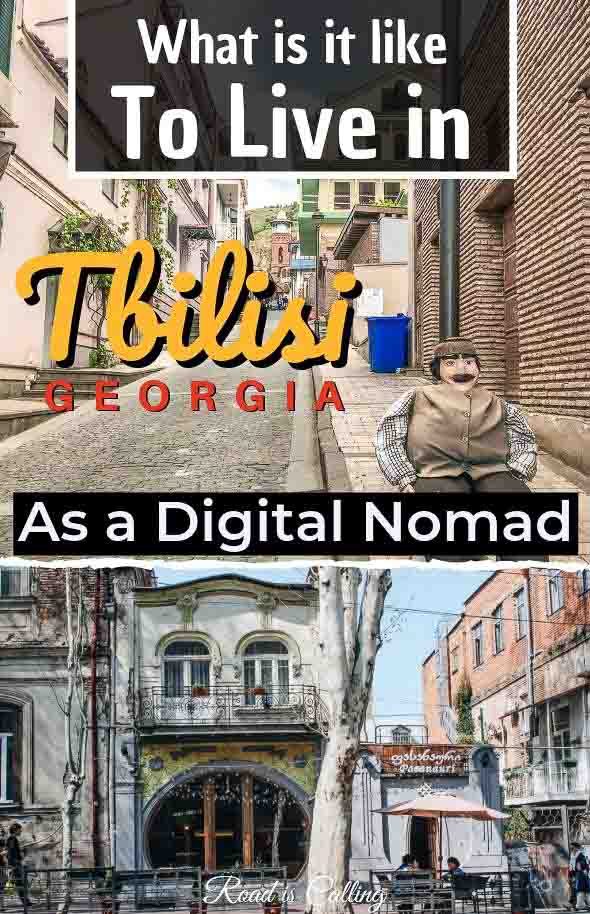
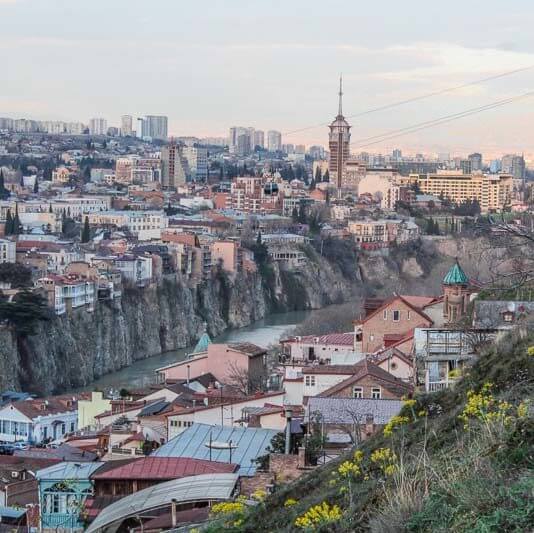
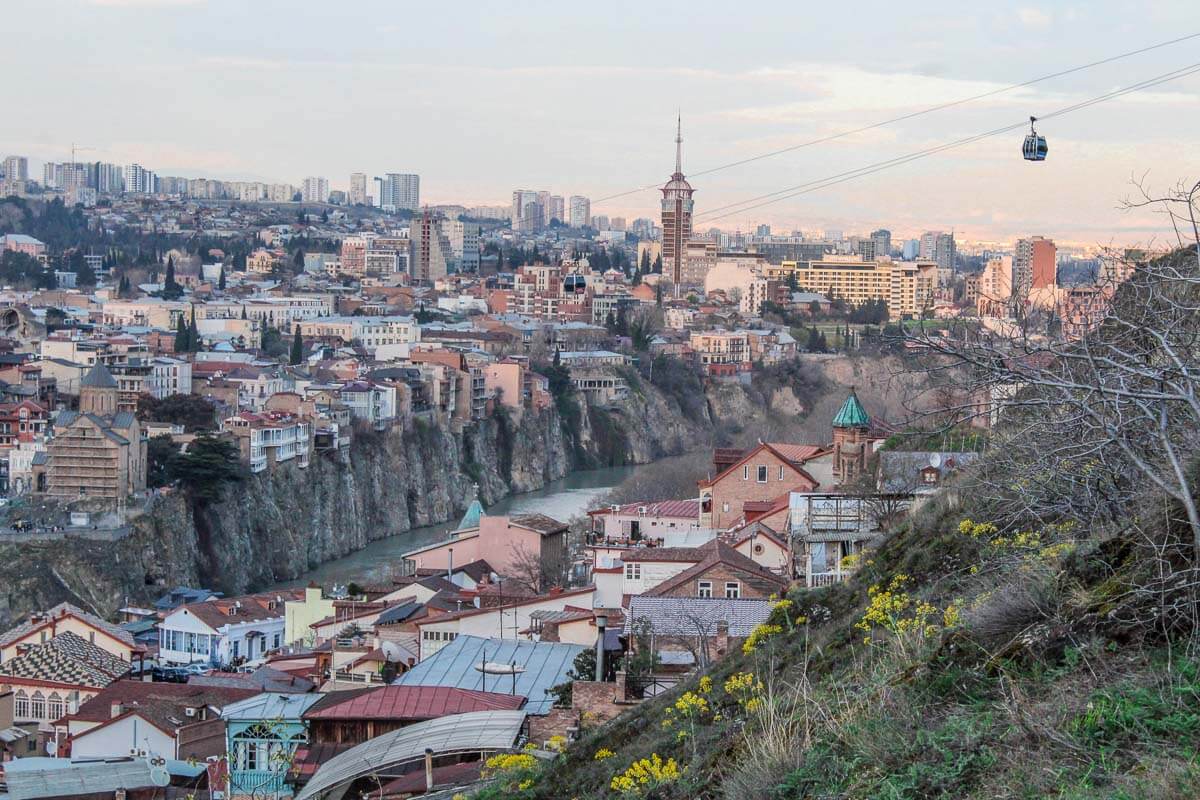
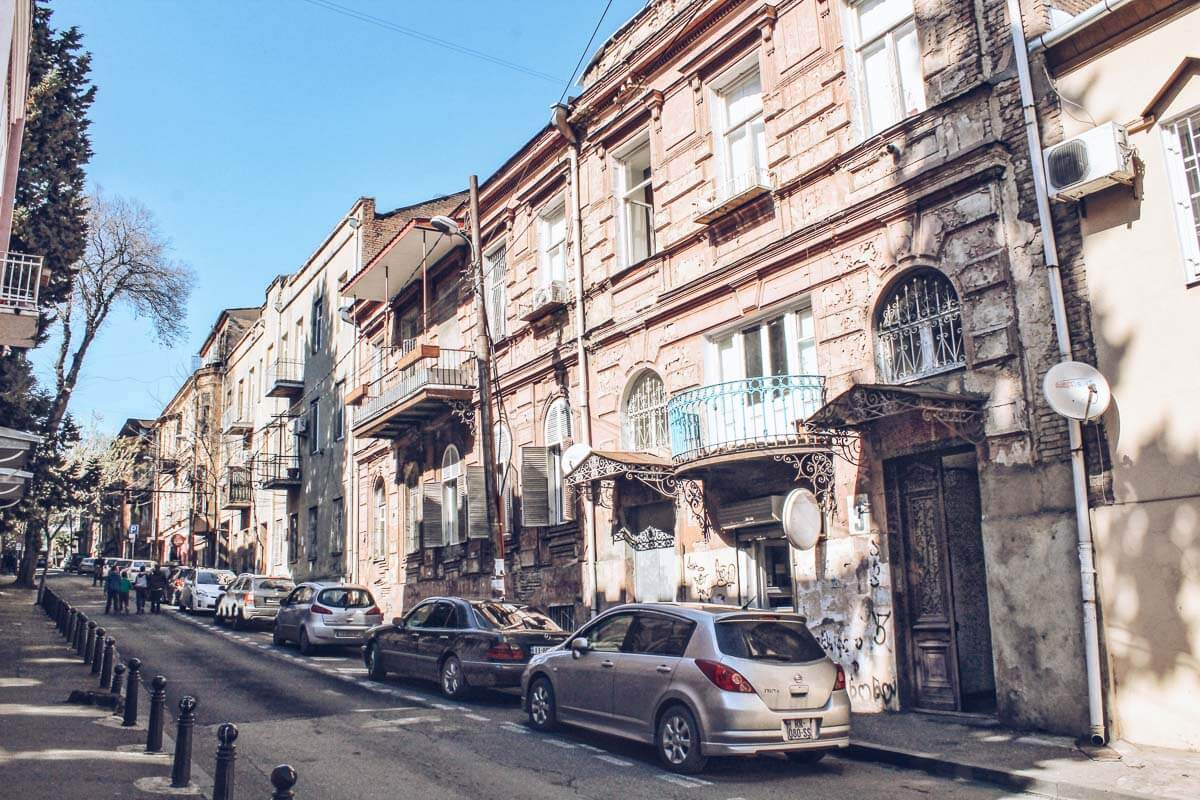
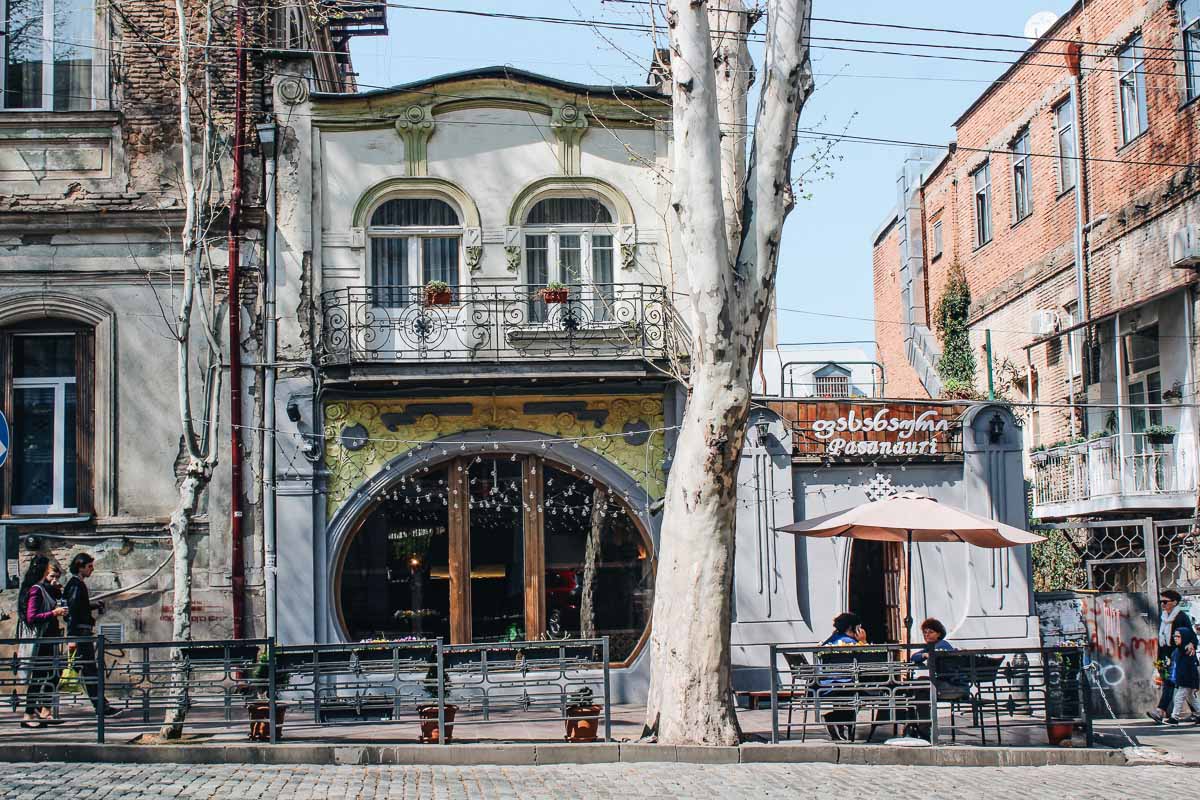
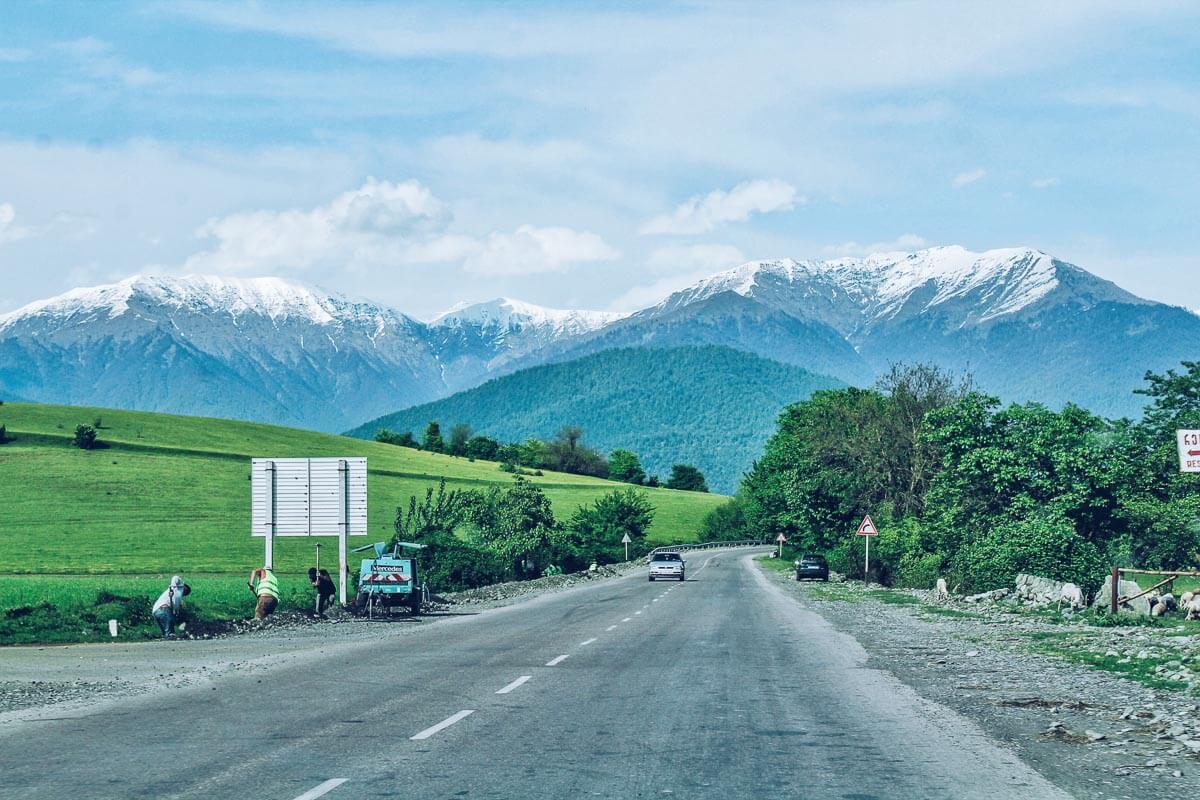
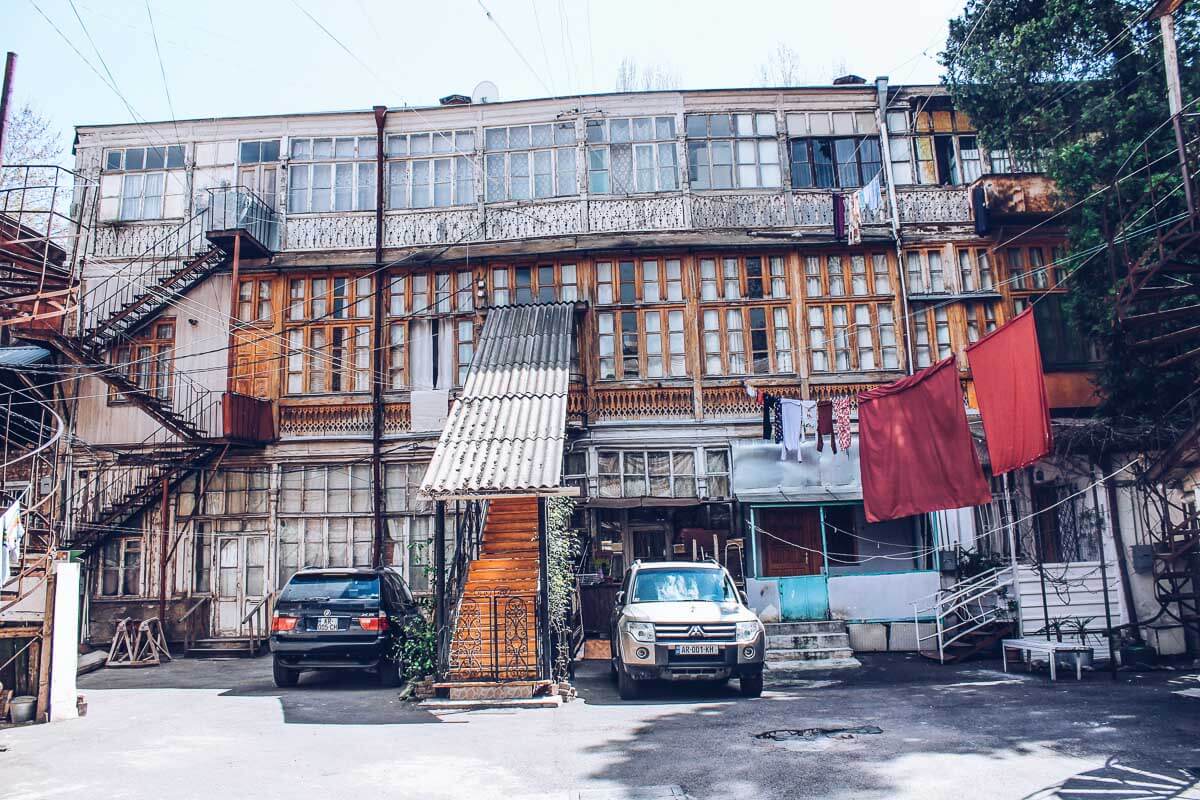
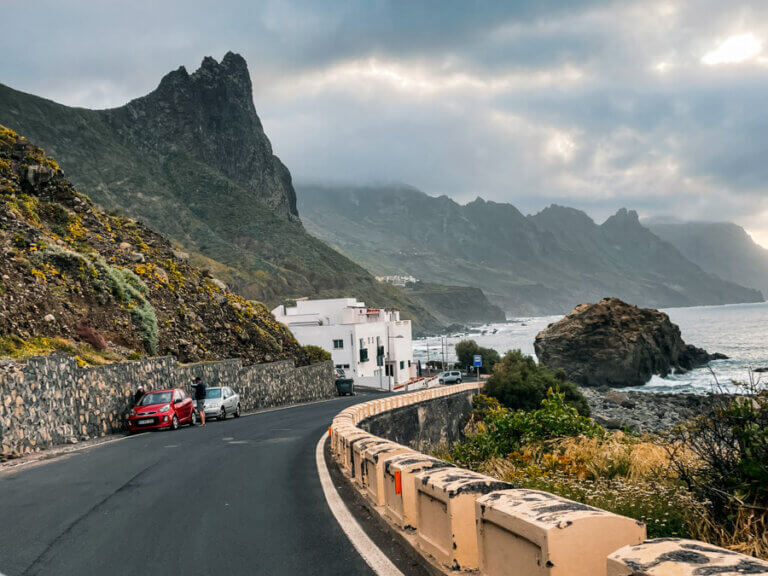
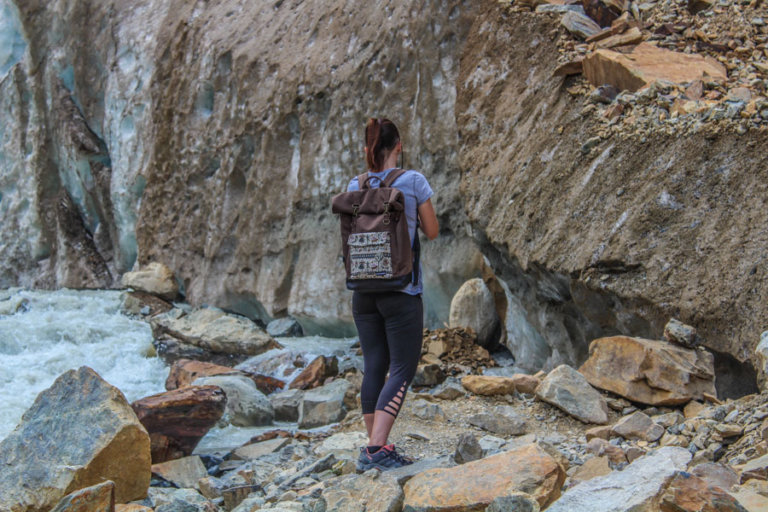

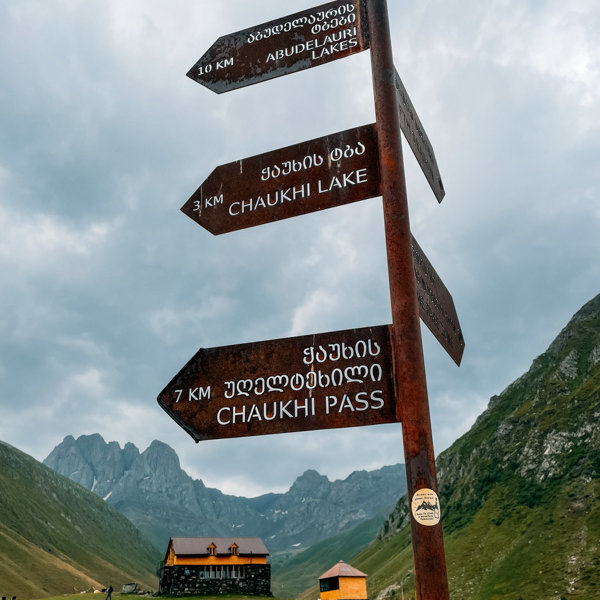
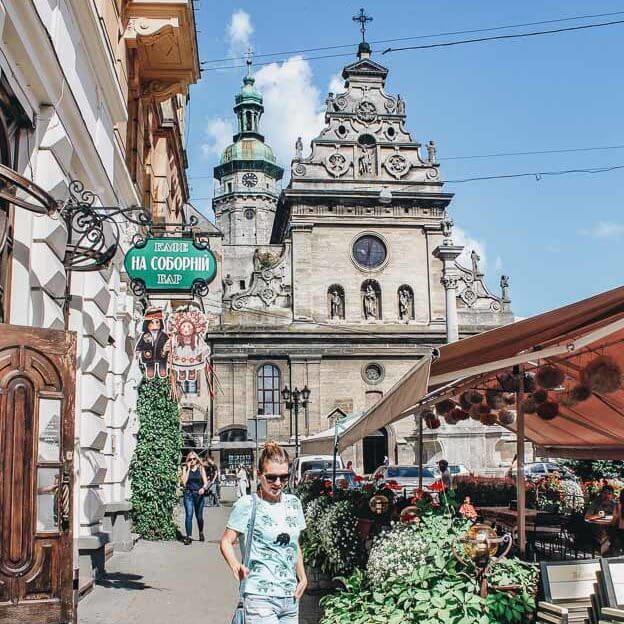
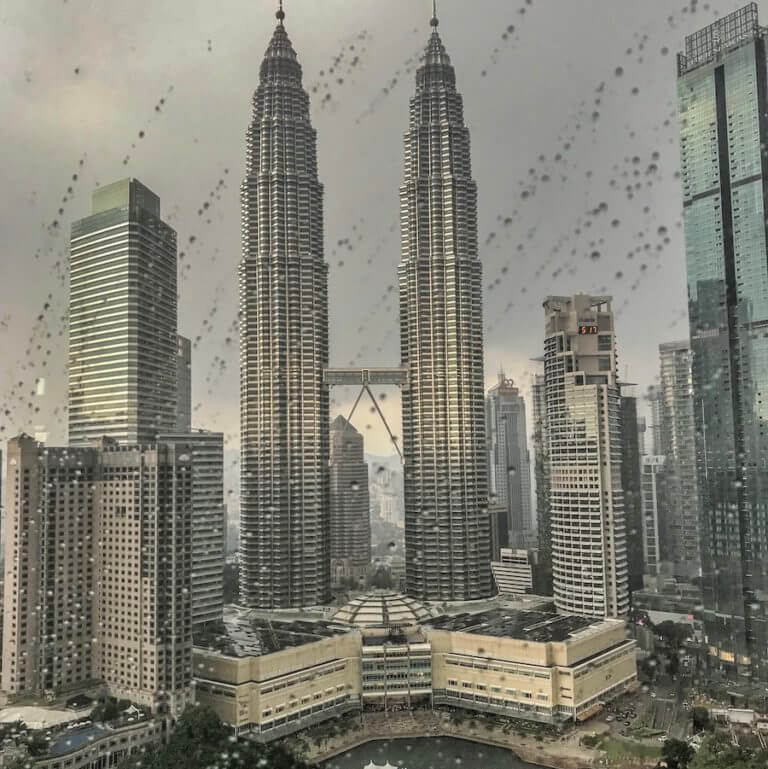
I’d add to your cons list: We had a really hard time with the pollution in Vake (the car exhaust smell was overpowering and we worried about our health), finding organic food is really difficult (and pricey), as a foodie – the options are actually extremely sub-par, and health care is very bad. We booked an early flight out because I had a horribly botched root canal there. Our experience was that healthcare professionals are severely overworked because they aren’t as well paid as they would be in other parts of the world. The dentist I went to was working multiple jobs to make ends meet. Not a recipe for great health care.
The city may very well be a good fit for some people, but some of the trade-offs are really major.
Hi Gigi, you are so right about the pollution, it’s pretty bad everywhere in Tbilisi. We are in Upper Vake, on the hills, so the quality of air is a bit better here.
Health care is not the best, I will also agree on this one. Although we found a good dentist who did a great job and didn’t cost much.
Tbilisi can be overwhelming and definitely not for everyone but there are still people who will enjoy it here.
Thank you for your input!
Hello, I am in Tbilisi now and looking for a dentist- can you tell me which dentist you visited in Tbilisi who did a great job? Thank you!
Hi Jen,
I have been to two places but a female doctor in her private clinic on Vasil Barnov 24 (or 26) Street was particularly wonderful. I can’t remember her name but together with her husband they are the only people who are working there. You can just show up or call her on this number: 298-25-24 or 599-93-26-16. Her English is very poor, she is using a translator to communicate with English speaking patients but she does her job very well. Try to ask a local to call her and set up an appointment for you or if you are not living far, go there at your earliest convenience.
Another place I recommend is Albius Dental Center at 27, Revaz Tabukashvili Street. Their dentists speak English which makes it easier to communicate, prices are very affordable and dental work is great too. At this clinic, you can also show up and they may take you in right away.
I hope it helps. If you have any other questions, let me know. Good luck!
Thank you for so many details, especially for mentioning about gluten free products. I am now going through set of interviews and expecting to get an offer soon from my company who also has office in Tbilisi.
The only problem I have is my allergies. I am severely allergic to a few foods and gluten is one of them. Living in a city/country where people don’t take those who suffer from food allergies seriously is so difficult. Do you think I’ll be able to adjust in Tbilisi?
Hi Andrea, you will be able to adjust your eating routine in Tbilisi for sure! That’s true that stores have a limited selection of gluten/dairy free products and they are more expensive but you will be able to find them. Goodwill and Agrohub are the best stores for that. Plus, if you are cooking at home, omitting gluten should not be a problem.
Also, for eating out, I suggest restaurants that offer international foods since they are more aware of gluten intolerances. Smaller local food only cafes and street food stalls are not.
Thank you for such a detailed review. But you know, in Ukraine, the situation that you described 20 years ago and now has not changed much, someone drives a car for 5 million, and someone lives on $ 5 a day.
Thank you, Tori, for you comment. You know, in Ukraine actually the situation that I described 20 years ago has changed. Driving a car for 5 million and living on $5 a day are not the only indicators of how well or bad the country is doing. Of course, there are still a lot of people who live in poverty but overall things changed.
“Anya is Ukrainian-American”. Being a US citizen abroad can be difficult, given the insane taxation regime the US imposes on US expats. How do you deal with it?
I am paying taxes only in the US. I don’t work any other jobs in other countries. But the U.S. has tax treaties with a number of foreign countries when residents or citizens are taxed at a reduced rate or are exempt from foreign taxes at all.
That’s a good thought to take into consideration. And actually for the tax reason we decided not to take a job opportunity in Norway. After paying insanely high taxes in both countries we would have been left with nothing to live on.
Hi Anya.
Your review blog was very helpful and I felt very similar feeling for living in such a place as Japanese who live in Vietnam. I also visited Ukraine 4 times and moving to Tbilisi in April. In my case I do keep business in Asia and moving to Tbilisi for resident place. I`ve been working in South East Asia for years and got tired of living such a chaotic environment. That is why trying to find somewhere quiet and not expensive, not crowded. Thought Tbilisi was the best place for that, but not sure after I red your great review.
Were you bored in Tbilisi? I mean in general.
Thanks
Hi Nori, you know, after SE Asia, Tbilisi is definitely going to be much quieter and less crowded place for you! So, don’t worry about that part. Also, it is cheap, has seasons (not constant heat and humidity like SE Asia) and beautiful Caucasus range nearby. I can assure you that living in Georgia will differ very much from the hectic life in Asia. And it is NOT going to be as chaotic as in Asia.
However, as I mentioned in this post, Tbilisi and Georgia as a country is not for everyone who wants to live there long term (as any other place I guess). I think you’ll be able to understand if it is for you or not only after spending some time there.
It all depends on what in particular you look for in a new country and what your lifestyle is.
We personally were not bored, no. There are a lot of things to do in Tbilisi and nearby, if you get to learn Georgian (or some Russian) then you’ll have even more options how to spend your free time. And, if your budget is higher than average and you love nature, the possibilities are endless.
For us, that was not the reason why we decided to leave. It was more about the quality of life in general. I explain in this post what didn’t work for us.
Both of us loved Georgia and especially we loved people there. We made some friends and plan to return this year just to be able to see them again. However, we don’t want to live there long term. I hope I was able to answer your question!
I’m Italian (Milan) and I have been living in Tbilisi for two years. Most things you wrote are relatable, and I appreciated the fact this article isn’t the usual “love affair after two days” that I see often. However, I would like to add a couple of things:
First of all, I beg to differ on food prices. Not in many European CAPITALS you can eat with 13€-18€ per two (I used euros because, well, we’re talking about European countries). Sure, it might happen in smaller towns around, but the same applies for Georgia, especially if not too touristic. A dinner in Chiatura or Gori might be around 10 euros per two. Even in not very expensive countries, a dinner in a capital will be more expensive. In Bucharest a dinner per two in a mid-range restaurant would be around 145 lei (around 30€). If you choose cheap eateries everything changes, but then I know places in Tbilisi when I can eat for 8 lari (2.5€) and have two courses, water, wine and bread.
Moving to my pro and cons, well, what I like about Tbilisi (and Georgia) is that it’s a place where I can immerse myself in the local life and avoid expat places altogether. According to what I read (and to what many of my friends told me), the opposite happens places like Chiang Mai, Bali and Ho Chi Minh City, where you just hang out with other white Westerners and the only contact with locals will with serving staff and shops. I suspect your mileage may vary, but undoubtedly the separation is wider. Here I hang out with Georgians (I made the effort of learning the language to a maneagable level, something locals appreciate a lot) and I rarely feel the need to do otherwise.
Another big thing, for me, is that unlike many Europen capitals, the Western mainstram pop culture made less of an impact here. The result is that you can go to bars and hear the music the owners like, rather than what is hot in London, New York or Berlin right now. This might seem a rather irrelevant thing, but for me, living in country where I don’t need to wear headphones 24/7 to avoid being exposed to Despacito and other Top 40 crap is something big. I’m also one of those who don’t give a damn about Bassiani and the local techno scene, as I don’t like techno. 🙂
As for the cons, Internet speed is averagely quite bad, with some excellent exceptions. This is not ideal at all for digital nomads. Data plans for smartphones are cheap, though, so for emergency one can always rely on their personal hotspot. Also, service in places is generally bad, but I got somewhat used to it. I appreciate the fact it’s bad for everyone, not just for tourists 😀
Thank you, Giorgio, for adding so many valuable details.
really surprised about your interest speed comment. Magti is the best interest I’ve ever had anywhere I travelled. Maybe I’ve just been lucky
Hi Anya! Your realistic take on daily life is helpful to me right now as I make the decision to move to Georgia or not. I have lived in (and traveled to) quite a lot of countries, and I am always able to find a way to make myself enjoy my stay; however, the one thing that will drive me straight to misery is sexual harassment on the street as I walk. What is your experience with it in Georgia? If it is an issue, would you say that it’s better or worse in Tbilisi? (I should mention that I’m the kind of person who does research on what the average woman wears in places, and I dress myself to match the level of conservatism. As we all know, this doesn’t have too much of an effect on the harassment unfortunately…)
Hi Helene! Thank you for stopping by and reading my post!
Regarding your question… I don’t think you should worry about sexual harassment in Tbilisi. I totally understand what you mean and how common it is in some parts of the world but Georgia doesn’t really have this problem. It definitely may happen in bars or maybe some type of ‘late night’ establishments but on the street just when you are walking by… not really.
The only “problem” with Georgians that many people take for harassment is their excessive hospitality and readiness to help. I had one situation happen to me on a few occasions in Tbilisi (and Batumi) when I was walking in the city center looking for something (or someone) and there were people who followed me, asking if I was lost and needed help. Even after responding that I was ok on my own and that I am actually living in Tbilisi and know my whereabouts, they were still somewhat obtrusive. But after a few minutes of chatting, they would leave.
When my friends (from Canada) were visiting, they absolutely disliked this trait and didn’t feel comfortable. Mark and I appreciated this excessive care. So it all depends on how you personally look at it. But again, I wouldn’t worry about sexual harassment as such.
thank you for the open feedback on your experience. Find it useful as I’m going to Tbilisi for a while myself.
I am wishing you all the best, Andrii! We have recently arrived in Tbilisi again and noticed how much the city changed (for better) during these 2 years but it also got much more expensive. Enjoy your time here!
Hi Anya!
I find this blogpost highly valuable. Thank you for writing it and asnwering all the comments.
How much more expensive has it become? How did you notice the increase in prices?
Thanks again
Hi Brandon, I’d say that the total increase was 20%-50% depending on what we talk about. Prices in restaurants and cafes increased by 20-30%, the same goes for rent and utilities, groceries increased by 30-50% (depending on a product).
Surprisingly, transportation costs haven’t changed a bit. You still pay a ridiculously low amount of money for a ride in a bus without AC on a day with a 38C temperature outside, fun but cheap. Taxi cost has slightly increased but it is still cheap.
2 years ago we could easily live with $1000 (or even less) per month what would include occasional eating out, tours, events, trips to the mountains, Kakheti, or nearby. Today, we need a minimum of $1500 for the same level of comfort and lifestyle, but that is not anything extraordinary.
Inflation for some reason is pretty high in Georgia and per some local experts, it is going to continue to rise. But of course, for many expats this increase is not noticeable since their salaries are on a higher side too.
Hi Anya,
I really appreciate your essay. It is very different from everything else that I have read about Georgia.
My wife’s experience would likely be much more like yours; not liking the air pollution, lack of central heat, old appliances, and the chaos of a 1500 year old city.
I would be very interested in hearing your updated sense of the city, when you are ready!
Hi Jeff,
We are actually back in Georgia now. Arrived in Tbilisi at the beginning of June, spent a few weeks there but then ran away to the mountains. And what can I say.. if shortly, Tbilisi has changed for the better in some ways. It got new roads and lots of new construction, also it looks cleaner than it used to be.
Still, I don’t like it and don’t feel comfortable there and one of the reasons why is probably people. I don’t know what happened during the last two years (probably covid is to blame) but people became hostile and somewhat angry. Georgia was always known for its amazing hospitality which I don’t feel is the case anymore.
Poverty is seen more than it was before, there are still lots of stray dogs and a lot of beggars on the streets.
I am going to update this post soon and reflect on what is it like for us here today and add much more new details, so hope to see you here again!
Hi Anya,
Thank you for sharing your experience with us. I have a question in regards to internet speed and reliability in Batumi and Tbilisi. I have a business that requires a lot of zoom meetings and webinars. Is the internet good enough for such a thing these days.
I would deeply apricate it if you can help me with this matter.
Thank you
Eddi 🙂
Hi Eddi,
Batumi and Tbilisi have no problem with the Internet, the speed is decent and should be enough for zoom meetings. But I would still ask your host about wifi speed before you come, with covid many apartments have been sitting empty and hosts had to cut costs on wifi packages. That’s what I faced recently and had to upgrade at my own expense.
I hope it helps!
Hello Anya,
Thank you for the post, It helps me a lot. My husband and I are thinking to move to tbilisi soon I and open a small business there. Can you please advise if it still easy to get the business certificate and can you please advise someone to help us to find a suitable location for our store .
Thank you so much for your assistance.
Hi Carolina,
Sorry for my late reply, yes it is still easy to receive a business permit in Georgia and now is actually the best time to move here! In regards to someone who could help you find a suitable location, I’d recommend you join this group for expats (if you haven’t yet) and ask around. There are a lot of members in this group and someone will definitely help you find an answer.
If you have any other questions that you’d want to ask me, also feel free to do so!
And good luck to you!
Hi, thanks dor your elaborate and good and honest info!
most destinations are praised as ideal, i actually wanted to move there, bcs Europe becomes very expensive and our energy taxes are rising again next year!
i struggled through 2 yrs of research, broke off a vacation plan to Chole one year ago due covid, spent a cold winter in my moldy asbesto wasted house in Austria( my neighbour waste everything, the CUT asbesto cement like 100 yrs ago! ) and broke off a flat contract in Germany last Sept., the most costly weekend of my life bcs they simpky do as they please and send you bills for nothing after trying to fraud you).resumee:i had this winter for checking further tax laws and obligatory health care! Argentina introduced helath care costs last year( it was free before that! ) and 17% there or 9% in Peru are a joke ( bcs you get nothing, but high expat income 4-6 times a worker gets there makes a difference in fees based on %!).
another issue is the “tax free import of personal goods when relocating: they charge 30 euros per package! so you pay 1,- euro per kilo of transport on customs clearance, and another 10 in Europe to the agency to provide those stupid newly requested tax bills for every stuff you send out or in the EU!
Lgbt should avoid Georgia, it,s not tolerant at all! and domestic violence or the ” adorance ” of women( basically you need a dude for every shit you do there on business, not for bank or public office runs, but i need a lawyer to get an answer from a broker for some property fraud! 50/ hrs? that summs up)…
the embassies are very friendly and helpful , esp. in Austria, …but could not provide any legal paper for my medication to take with me🤷♀️
and the best way to bring 20 packs of luggage with you is per business ticket and overpay, so you get one extra hand luggage and can pay 60 extra ( from Europe) for the second pack( 30 kilos)…
no airline service ever answers, no real estate asshole either! it,s terrible, ..you always need a ” friend”…and i don.t pay for that shit,,,
renting is actually expensive: 250-500 for a cold accomodation in Eastern Europe is a fraud🤷♀️
safety seems to be ok….the rest, well i broke off after i was reading your report, i stilll would have waited for covid rules to end.
at the end: cheap food, low standards, safety hazzards in 80% of construction( this will become interesting with all those skyscrapers they build now) i got the info from the German investment board! 80% insufficient!
double paying for foreigners, you might not have that issue, bcs with Russian you are seen as one of them…
Ukraine: better? you have a war there! i know women from Ukraine, still patriotic, but never going back🤷♀️
car import: there is a tax calculatir which gave 3500 euros import tax for my 26 yrs old 90 ps gasoline powered convert volkswGen ! no thanks!
as friends of mine declare every shit i cook as a miracle coming from heaven and soooo goood! i assume that me as an Austrian i.m spoilt in such topics: old churches🤷♀️food🤷♀️hills🤷♀️who cares?
sad, very sad!
thansk for the landfill issues and the bad air quality you mentioned, you helped me safe 600,- on travel costs, atbleast…and what is under construction on Tbilisi.s hills is just 1/4 of what is already approved, the city already starts to plan for improving the infrastructure! no good news…
Batumi: those awful sky scrapers, low technical quality, and a UK dude as a consultant? ( you get what i mean) …hands off!
thanks for the SEA report one guy here mentioned, Europeans always dream about Asia, i noticed it,s not worth it anymore, i.m 30 yrs too late🤷♀️
thanks too all, Selina
💋
Hi Selina, thank you for stopping by and putting in your two cents!
Hi Anya, thank you for the writeup. Currently, I live in Nigeria and planning on studying nursing in Georgia. I already sent in my application to University of Georgia, Tbilisi. While searching for affordable places to study nursing, I came across Georgia.
What do you think about the quality of education in Georgia?
Hi Halima, as far as I know, in recent years a number of reforms were adopted to change the education system in Georgia and build it on the example of the American and European systems. In 2019, Georgia became a member of the European Association for Quality Assurance in Higher Education (EQAR) which now means that diplomas of Georgian universities will be automatically recognized in Europe.
Also, it strengthened partnerships of local universities with European universities and research institutes what in turn provided opportunities for students from Georgia to go to Europe for internships and exchange programs.
From what my friends tell me (who live in Georgia long-term), higher education here is on a very good level. At the same time, prices are much lower in comparison with many other countries. So you can get a first-class education that will help you become a highly paid professional and make a great career in your chosen industry. And medical schools, by the way, are very popular in Georgia among foreign tourists. They are citadels of good values and ideal places to study for both locals and foreigners.
I want to encourage you and say that you are on the right path, coming to study in Tbilisi is a very good choice!
I agree with all of your pros and cons. In the last years, since you wrote the post, I think things have become much worse. Georgian hospitality is nothing like I heard it would be. People are generally rude, sullen, and loud.
I live in Saburtalo. There is never a night of peace. Walls are thin. Neighbors talk loudly until 5 AM. Cars honk in the parking lot at all hours. People yell and shout from window to ground, ground to window.
Beggars are everywhere. Foreigners are sometimes harassed. There is a growing anti-foreigner nationalist movement encouraged in its violence by the Georgian church. I have almost three years of experience in Tbilisi. I would not recommend it to anyone.
Hi Steve, thank you so much for this comment because you actually spoke out my thoughts! I haven’t updated this post yet but intend to do it soon since some things have really changed and they changed for the worse, and I want to talk about them.
We are actually back in Tbilisi now (it’s been almost 2 months since we arrived) and honestly, we are somewhat lost and can’t understand what happened to people and their famous hospitality. Not sure if that’s the covid to blame but people are for the most part rude, unwelcoming and disrespectful. We encounter cheating in restaurants (like 95% of the time) on a regular basis (not only in Tbilisi but everywhere in Georgia) and occasional harassment. We feel the poverty in the air and anger related to that.
Another thing, I don’t know what’s the deal but prices skyrocketed like crazy. Everything became much more expensive although the level of service dropped.
We came to Georgia for work and will be staying here for a while but we are now seriously considering another place where to base. I feel like Tbilisi is just too much to handle.
Wow! Are you still there? Today is 9 March 2022.
Hi Anya, thanks for all the information. I’ve been working online and travelling full-time since 2016 and I’m currently in Serbia. I’m considering moving to Georgia in November so your post has been very useful! Thanks again!
Hi David, I am glad this post was helpful and good luck with the move! 😉
Good analysis of Tbilisi and showing the pros and cons. I look forward to moving there this autumn 2022.
Hello Anya, are you still living in Tbilisi.
How are things there now?
I’m living in Barcelona but i was considering moving there few years to save some money. Barcelona are becoming really expensive.
I was so excited by the idea of moving there but then i read your post. It seems it’s not a place i would live, even if it means low taxes.
We are really conscious about recycling, pollution is definitely a problem.
Have you seen by improvement recently?
I might have to consider Cyprus instead.
Hi Federico,
No, I don’t live in Tbilisi anymore and don’t think I will ever be able to while there is still the same mentality and pro-russian government. In fact, I went back there last summer (for a long-term work project) and thought that things changed and I could possibly try to live there again for at least a year, but it wasn’t the case and instead of improvements I noticed deteriorations.
After covid people got much poorer, angrier, and in many cases more hostile. I personally didn’t feel safe there. Well, after being harassed on multiple occasions and eventually attacked in one of the ‘safest’ tourist areas I realized it was not a place for me, so I had to terminate my contract and leave.
There are many more reasons why this country is not for me but I’d need to write a separate post about it to explain it all.
Even with the beginning of the war in Ukraine, when I was running from missiles, Georgia was the last country I was considering moving to in order to escape the war. Actually I wasn’t considering it at all to be honest.
Another thing, Tbilisi is now much more expensive. I don’t know how much you’ll be able to save there, prices for accommodation skyrocketed as for everything else and as everywhere else. Taxes are still low but life became much more expensive. If you live on a modest budget and want to save money, I’d suggest you look into the suburbs of Tbilisi or possibly Kutaisi, Borjomi, Bakuriani (outside the winter season) but not Tbilisi city itself.
I know that everything in life has a price and I choose to pay more for my safety, comfort, peace of mind, and understanding that I live in a society that shares the same values. But that is a personal decision.
I don’t know how you’ll feel about Tbilisi as well as I don’t know your life values. You may like it despite the pollution and other problems. You may find it an economical place depending on your budget. Before moving to Tbilisi for the first time, I lived a little bit in Santander. There, I was spending almost the same amount of money per month as in Tbilisi but the quality of my life was higher in Spain. But I also lived in Santander in winter, so maybe that’s why my spendings were lower.
I think a lot of what you wrote about Tbilisi is kind of true but it’s a giant matter of perspective.
I come from Germany and UK and those delapidated, falling apart houses are a blessing. I adore them and it would be very sad to see them go or looking like Switzerland. It’s boring and lacks charm. I’m a big fan of shabby exterior and tidy, high-end interior. It gives contrast and depth. Similar to L.A. where an inconspicuous, boring house could be an amazing coffee shop inside with Jonny Depp or Alicia Keys standing next to you.
In terms of prices Tbilisi beats even in 2024 all expectations. I buy giant amounts of fruit and veges and it’s a fraction of what I’d pay in London or Munich. in fact it’s impossible to buy that quality of produce in London or even Munich in the summer.
You’re right about the pollution in Tbilisi. But it’s by far better than London. What’s important is how big the particles are. In London I always get asthma despite the air looking clean. The diesel particles are less than 2.5 microns. They get super deep into your lungs and are extremely dangerous. Tbilisi polution is dirtier but “healthier”. I never have asthma in Tbilisi, despite constant petrol smell.
Naturewise, I live in Vera, 10 minutes from me there are hikes up your roof. Can walk for hours in the wilderness and water falls.
Driving is bit strange, you’re right, but not as bad as Italy or Dominical Republic. The roads are quite wide so even three cars can fit in one row. Worst is Dominican Republic. Georgis is 6 out of 10 I’d say.